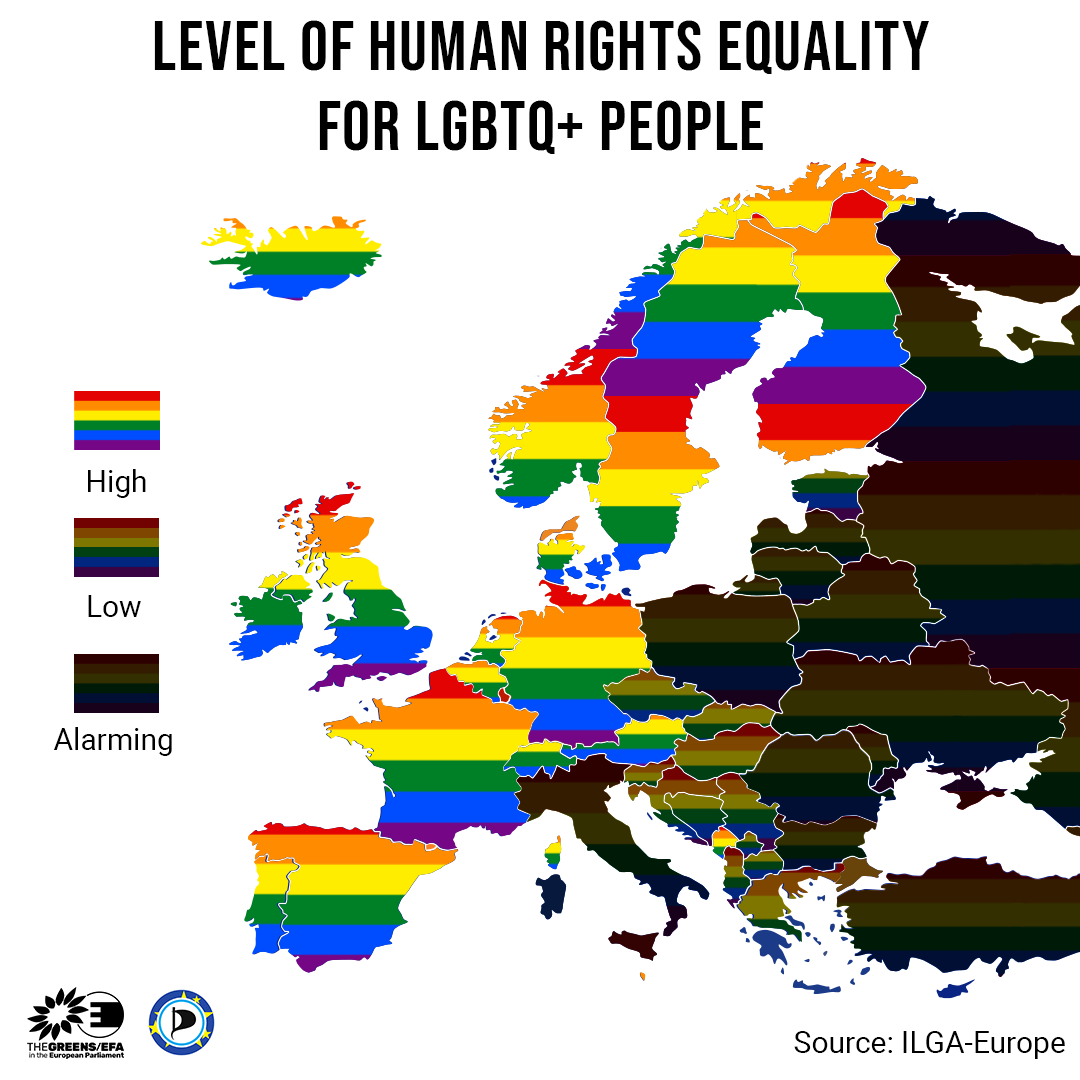At the end of October, the Italian Senate torpedoed a bill against homophobia and discrimination against minorities.
Two men brutally beaten by hooligans at a train station for kissing in public. Constant threats from a neighbour with a baseball bat who says he will burn down your flat and car at night. Spitting and cursing at a couple of women holding hands. Police response? Lukewarm. Sadly, this is the reality for many people in Italy. In fact, Italy is one of the last European countries to have no national anti-discrimination laws against sexual minorities.
A great hope for many people was the long-overdue law that would make discrimination and violence against LGBTQ+ people, women and people with disabilities a hate crime. The idea of a fair and free Italy for all, without distinction, is supported by two thirds of citizens – unfortunately it still remains only on paper. The bill was buried by the Church and by the senators of the Italian far right, who outvoted the bill by mere 23 votes.
With the rejection of the anti-discrimination law, Italy is gradually becoming more and more like the countries such as Poland and Hungary, where governments have for the past few years artificially created hatred against minorities and LGBTQ+ people, making them scapegoats. Yet, at the same time, the Member States of the European Union are obliged to respect and actively monitor adherence to fundamental values such as respect for human dignity, freedom, democracy, equality, the rule of law and honouring of human rights, including the rights of minorities.
In Europe, we must not allow double standards. Poland and Hungary have been criticised for trampling on minority rights (but not only for this), while the situation in Italy has received but lukewarm sighs from the Union. All Member States should uphold the values that they have committed to defending through their membership in the EU – without exception.
Minority rights
Italy is the only Western EU country that does not have blanket laws against discrimination against sexual minorities. The only other countries besides Italy are Poland and Lithuania. Italy has laws against discrimination and hate speech dating back to 1993, the so-called “Mancino Law” – but this only mentions “racial, ethnic, national or religious” motives for hatred.
Anti-discrimination laws aim primarily to protect vulnerable groups of people from physical as well as other forms of discrimination. In this case, for example, the law could protect LGBTQ+ people from being fired from a job solely on the basis of their sexual orientation. For proven discrimination on the basis of some of the values mentioned, the perpetrator would face a year and a half behind bars or a fine of €6,000.
There is certainly a need for such a law – around 20 000 cases of discrimination against people on the basis of their sexual orientation are reported in Italy every year, of which around 9% are serious problems. Moreover, the country is well below the EU average in terms of tolerance of LGBTQ+ people – according to the Eurobarometer, only 55% of Italians tolerate sexual minorities, compared to the EU average of 72%.
The Church and the Far Right
Representatives of the Italian far right and the Vatican are very vocal against the efforts to extend the anti-discrimination law to sexual minorities. As is the case in other countries, these parties are using completely nonsensical arguments against sexual minorities. A prominent speaker is Matteo Salvini, a former MEP and leader of the League of the North, who is a long-standing ally of other far-right European politicians such as Marine Le Pen, Geert Wilders and even Tomio Okamura.
According to Salvini, the new law is simply a “law against free opinion”. He also claims that the new law is a direct threat to the traditional family of a man and a woman and that those who advocate traditional values will be prosecuted as a result of the law. I have no idea what kind of world the right-wing populists live in, but in the normal world beating people up in the street for their sexual orientation is really not a free speech, it is a despicable crime.
The Vatican, which also doesn’t like the law, is making a similar argument. Last June, for example, it suddenly started to put pressure on the Italian government to change the wording of the law because it could threaten the “freedom of thought of the Catholic Church”. Exactly what such freedom of thought means I guess I will leave to interpretation.

The South is heading… East?
The huge backlash against the anti-discrimination law by Italy’s far-right and conservative politicians is unfortunately nothing new. Indeed, similar cases have long been observed in other Member States a little further east. Sadly, the conservative Polish party PiS of Jarosław Kaczyński and the Hungarian Fidesz of oligarch Viktor Orbán have been working to suppress the rights of sexual minorities for a long time.
In Hungary, living conditions and rights for LGBTQ+ people were improving until the conservative Fidesz came to power. Since his accession, Viktor Orbán has continually portrayed the minorities as a threat to Hungarian nationality, culture and family. He has thus created proverbial punching bags out of the minorities, to whom he diverts attention whenever his government manages to get something wrong.
The rights of sexual minorities in the country have begun to shrink radically, including bans on marriage or adoption by same-sex couples. The latest big shot at human rights was the new so-called “Anti-LGBT” law, which more or less “banned” LGBTQ+ people, following the example of Russia.
In Poland, the perception of sexual minorities has always been a bit more cautious due to the prominent role of the Church, which has been openly negative towards the rights of sexual minorities. Since the rise of PiS, however, the conservative party has made a scapegoat of sexual minorities, following the example of Hungary. Top PiS politicians openly promote discriminatory laws against the LGBTQ+ community, calling homosexuality an ‘ideology’. The situation came to a head a few years back when roughly a third of Poland declared itself an “Anti-LGBT Zone” with the vocal support of PiS.
The inspiration of the Italian far right by the Visegrad one cannot be overlooked. The darling of the Italian far right, Matteo Salvini, is even already in talks with representatives of both countries to form a club in the European Parliament, where they would most likely continue with the actions of the V4 states – trampling on the rule of law, civil liberties and with the rise of authoritarianism.
Human rights must be defended
The European Union is based on several fundamental values and principles that all Member States have committed to uphold. One of these is Article 2 of the Treaty on European Union, which clearly states that “The Union is founded on the values of respect for human dignity, freedom, democracy, equality, the rule of law and respect for human rights, including the rights of persons belonging to minorities. These values are common to the Member States in a society in which pluralism, non-discrimination, tolerance, justice, solidarity and equality between women and men prevail”.
The European Union must guarantee equal freedoms and civil rights to all its citizens, regardless of their race, gender or sexual orientation. Court proceedings are already under way in Poland and Hungary, and the Commission has activated Article 7 of the Treaty on European Union. I am very sad that, although the Commission is (legitimately) dealing with these countries, it has so far relatively ignored the suppression of the human rights of its own citizens in Italy.
European laws and principles are to be enforced equally in all Member States, just as all Member States are to endeavour to respect the European laws and values to which they have committed themselves. The Commission should therefore intervene and devote its time to the situation in Italy. European minorities are threatened by a growing trend of discrimination at the expense of the rise of populist authoritarian governments. If the Commission does not strictly enforce these values, it may not even be possible next time.


0 comments on “ITALY: HUMAN RIGHTS? YES, BUT NOT FOR EVERYBODY!”